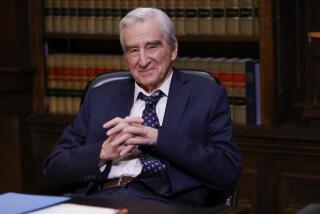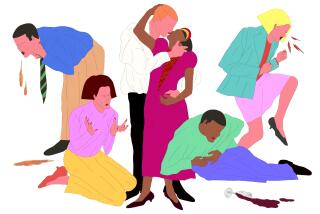Actors help doctors-to-be rehearse their bedside manner
- Share via
NEW YORK — Joe Jamrog was a passenger in “United 93,” a cop in “The Muppets Take Manhattan” and a doorman in half a dozen films and made-for-TV movies. He also plays a depressed widower before standing-room-only crowds at Columbia University College of Physicians and Surgeons here.
Medical schools are hiring performers like Jamrog to help train doctors for a new section of their national licensing exam that tests bedside manner. They may earn more than $20 an hour helping physicians-to-be learn to give bad news compassionately.
“I get to use my imagination more than in some other roles,” says Jamrog, 73. “It’s a wonderful opportunity for an actor to go through these problems.”
New York, where healthcare was a $47.9-billion industry in 2002, has six medical schools with a total enrollment of about 3,670. Actors are helping students steer away from the gruff, insensitive doctor on the television drama “House” and toward the caring medical professionals of “ER” and “Grey’s Anatomy,” says Joshua Stager, program coordinator at Columbia.
“A lot of these students are brainiacs who can absorb all the information they learn in class, but they don’t know how to talk to people,” he says.
Much like Cosmo Kramer, the “Seinfeld” character who portrayed a man with gonorrhea for medical students in a 1998 episode, the theatrical “patients” are given a character’s background and symptoms rather than a fleshed-out script. Then they must draw on their improvisational skills.
Nancy Franklin’s assignment one afternoon was to portray a 60-year-old woman complaining of shortness of breath. Her audience: seven medical students in white coats at Columbia University.
“How long have I been smoking again?” she asks, taking one last look at her notes. “Oh, I quit four years ago. Good for me.”
The new part of the licensing exam is based on the one given to overseas physicians who want to practice in the U.S. to ensure they are properly trained and can communicate effectively in English, says Erica Friedman, medical director of Mount Sinai School of Medicine’s Morchand Center for Clinical Competence on Manhattan’s Upper East Side.
For Janet Burnham, co-founder of Professional Actors Training and Helping, the fun is in the improvisation.
“We don’t know how we’re going to react,” she says. “It all depends on how the person interviewing us will handle it.”
Delphine Taylor, professor of clinical skills at Columbia, says that as students progress, so do the interviews. Actors shed tears or rage as they’re told that they have cancer, that a loved one has died or even that they are dying.
“It’s a real confidence-builder,” says Kristin Checchio, 24, a second-year medical student at Columbia. “You can see the improvement over a year and a half in yourself and in your peers.”
More to Read
Sign up for Essential California
The most important California stories and recommendations in your inbox every morning.
You may occasionally receive promotional content from the Los Angeles Times.










